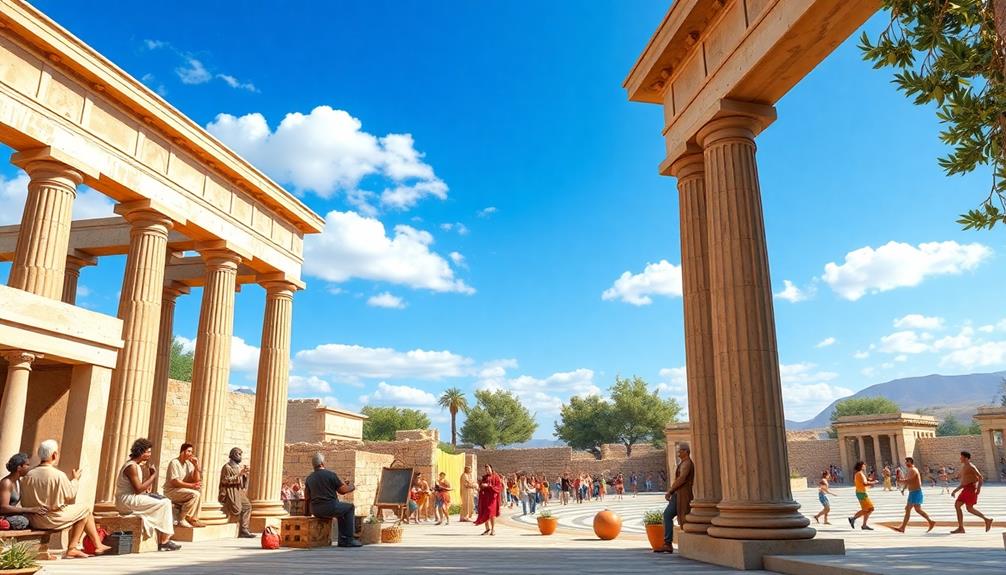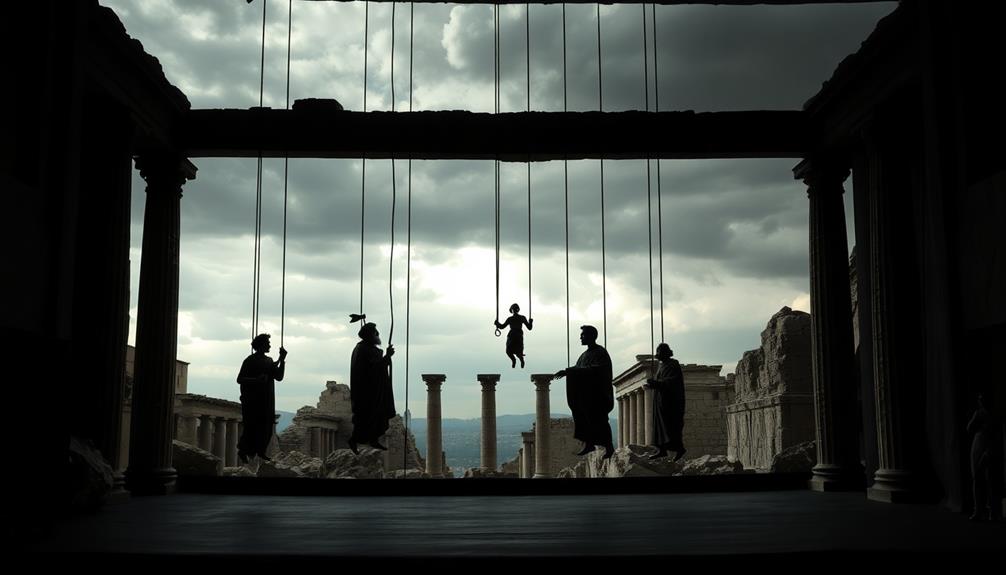Ancient Greece has shaped your modern world in ways you might not expect. From pioneering democracy, where Athenian citizens debated laws, to the revolutionary advancements in medicine led by Hippocrates, their influence is profound. You're likely familiar with the epic narratives and character archetypes from Greek literature that still resonate today. Plus, their architectural innovations, like the Doric columns, can be seen in buildings worldwide. Oh, and don't forget about the Olympics, which celebrate athleticism and unity. If you think #7 is surprising, you'll definitely want to explore more about these incredible influences.
Key Takeaways
- Ancient Greece established the first direct democracy, influencing modern democratic practices and political engagement worldwide.
- The Socratic Method promotes critical thinking, shaping educational approaches and discussions in contemporary philosophy.
- Greek physicians prioritized natural causes for illness, laying the groundwork for modern medical ethics and practices, including the Hippocratic Oath.
- The Olympic Games celebrated physical excellence, influencing the structure and ethos of today's international multi-sport competitions.
- Greek architectural elements, such as columns and symmetry, continue to inspire modern urban planning and cultural institutions around the world.
Pioneering Democracy
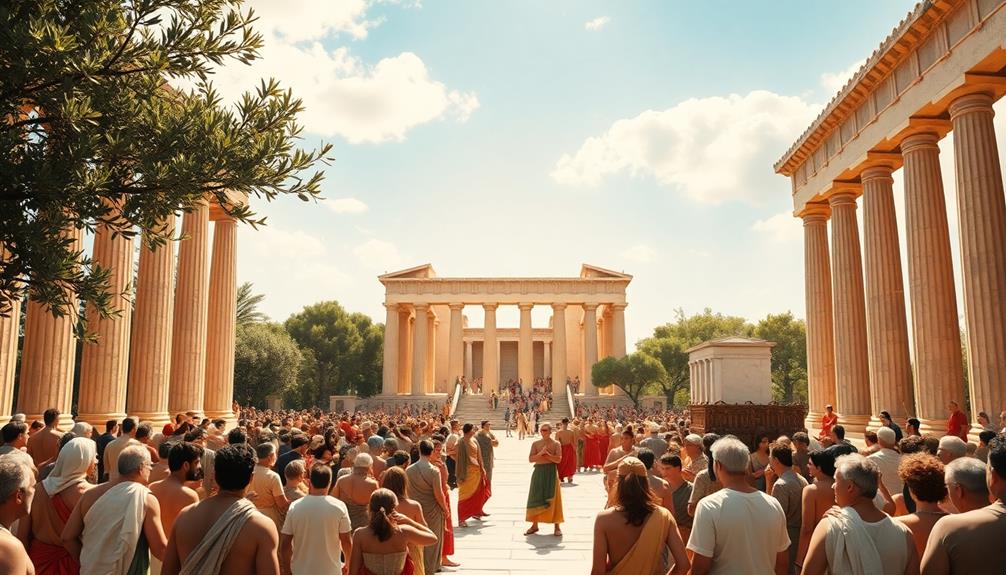
Ancient Athens laid the groundwork for modern democracy, marking a pivotal shift in how people engage with governance. In the 5th century BCE, Athenian democracy emerged as a pioneering democracy that allowed male citizens to participate directly in decision-making. You'd find the Athenian Assembly, where about 6,000 eligible citizens gathered at Pnyx Hill to debate laws and vote on essential issues. This assembly showcased early democratic principles, empowering individuals to influence their society.
While Athenian democracy had its limitations, primarily excluding women and slaves, it set the stage for concepts that would evolve into broader citizen rights. The practice of trial by jury, established in Athens, is a key aspect that continues to shape modern legal systems, ensuring fairness and accountability in the judiciary.
In addition, the use of ostracism, where citizens could vote to exile those seen as threats, reflects an early form of political accountability that encourages civic engagement.
Understanding these foundational practices helps you appreciate how ancient Athens not only influenced governance in its time but also laid the groundwork for democratic systems that embrace wider participation today.
Architectural Innovations
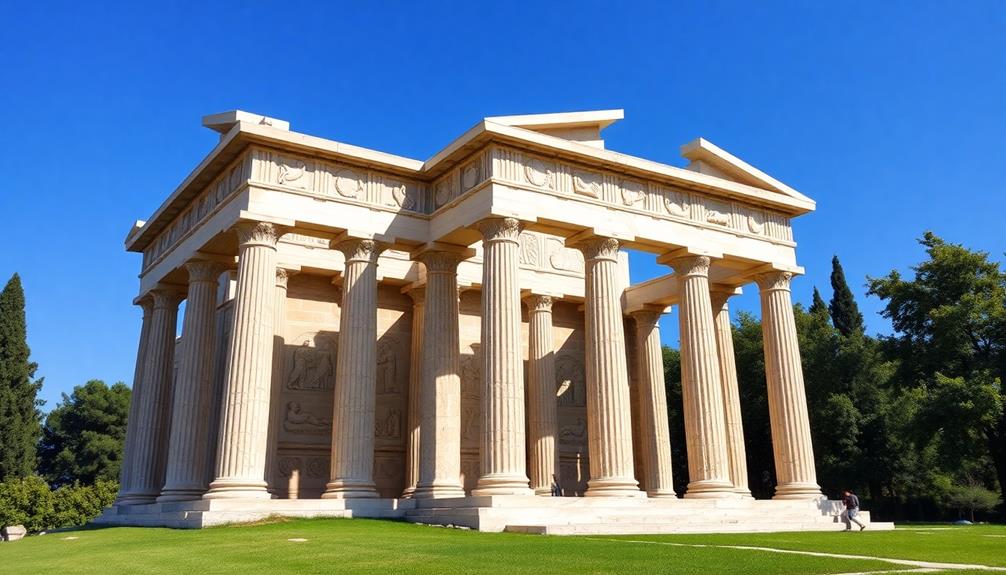
Greek architecture has shaped the way we think about beauty and design in buildings. The iconic Parthenon, with its Doric style, exemplifies the emphasis on symmetry and proportion that defines this architectural legacy.
You might be surprised to learn that the three classical orders—Doric, Ionic, and Corinthian—became foundational elements in Western architecture, influencing countless government buildings and public spaces throughout history.
The Greeks didn't just create stunning structures; they also innovated construction techniques. For instance, they employed entasis, a slight curvature in columns, to counteract optical illusions, a practice that still resonates in modern design.
When you walk through contemporary cities, you can see the principles of urban planning established by the Greeks in the layout of public spaces and civic buildings.
Additionally, Greek architectural elements like temples and theaters have inspired the design of modern cultural institutions and government buildings, reflecting the enduring impact of Greek aesthetics.
Advancements in Medicine
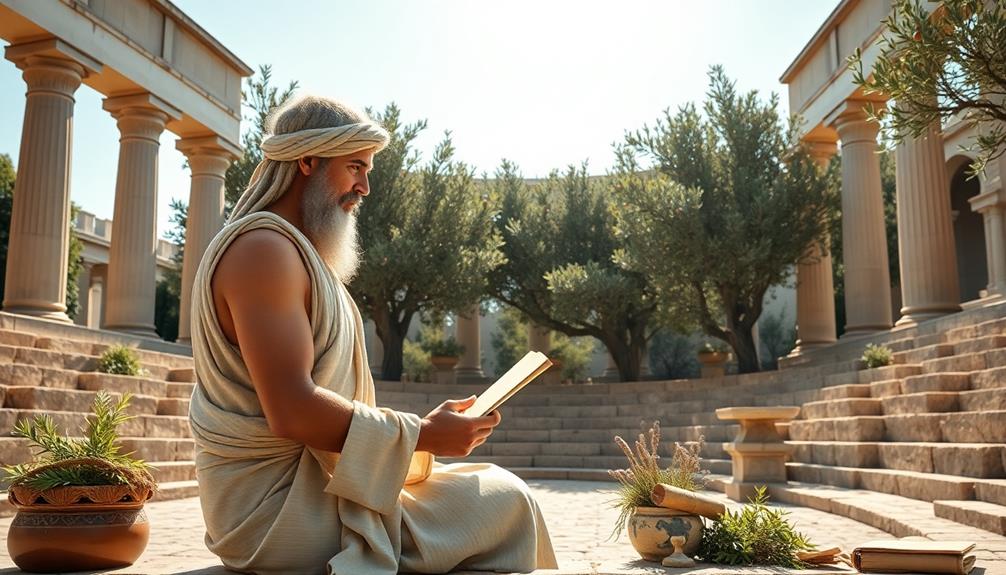
When you think about advancements in medicine, the legacy of Hippocrates stands out. His commitment to ethical patient care and the scientific method shaped how we view health today.
This emphasis on ethics is vital, as seen in the treatment approaches for various mental health conditions, such as BPD treatment benefits from psychotherapy.
Understanding these principles not only honors ancient practices but also enhances modern medical ethics and techniques.
Hippocratic Oath Legacy
The legacy of the Hippocratic Oath profoundly shapes modern medicine, serving as a cornerstone for ethical practice among healthcare professionals. Attributed to Hippocrates, this oath emphasizes critical principles like "do no harm," which are still paramount in today's medical field.
By shifting the understanding of health and illness from supernatural explanations to natural causes, Hippocrates laid the groundwork for what we now recognize as scientific medicine. This foundational shift parallels how proper care and diet are essential for other living beings, such as hamsters, as outlined in ultimate hamster care.
The Hippocratic Corpus, a collection of essential medical texts, introduced systematic observation and documentation of diseases. This move toward an empirical approach has greatly influenced how healthcare professionals diagnose and treat patients.
Additionally, the oath's focus on patient confidentiality and informed consent is crucial to modern medical ethics, ensuring that patients' rights are respected.
Variations of the Hippocratic Oath are recited by medical graduates around the world, highlighting its enduring legacy in the education and ethical training of new healthcare professionals.
As you pursue a career in medicine or engage with healthcare, understanding this legacy will deepen your appreciation of the ethical standards that guide the profession today.
Scientific Method Foundations
Building on the ethical foundations established by Hippocrates, the advancement of the scientific method marked a significant evolution in medical practice.
Ancient Greek physicians shifted the understanding of illness from supernatural causes to natural explanations, laying the groundwork for modern healthcare. They emphasized careful observation and documentation, fostering critical inquiry that's essential to the scientific method.
Here are three key contributions of Greek medicine to the scientific method in modern practice:
- Empirical Observation: Greek physicians meticulously recorded symptoms and outcomes, which encouraged a systematic approach to studying diseases.
- Natural Explanations: By seeking natural causes for illnesses, they paved the way for evidence-based treatments and a more rational understanding of health.
- Medical Ethics: The principles established in the Hippocratic Corpus continue to influence modern medical ethics, particularly in maintaining patient confidentiality and ensuring informed consent.
These innovations in medical practice not only advanced the field but also shaped the ethical landscape that governs modern medicine today.
Patient Care Principles
Although ancient Greek medicine focused on understanding the patient as a whole, it also laid the groundwork for modern patient care principles that prioritize empathy and individualized treatment. Hippocrates, known as the "Father of Medicine," made significant contributions by emphasizing the importance of observing patients and documenting symptoms. This practice not only shaped the diagnosis process but also established ethical standards that are still relevant in modern medicine today.
Additionally, the holistic approach seen in ancient Greek practices resonates with contemporary methods, such as those used in support groups for coping with conditions like breast cancer.
The Hippocratic Oath, rooted in these teachings, highlights the commitment to ethical practice and patient care that medical professionals uphold. By shifting the focus from supernatural explanations to natural causes of illness, ancient Greek medicine fostered a scientific approach to healthcare, which informs contemporary practices.
Hippocrates and his followers categorized diseases and proposed treatment methods, paving the way for clinical observation that remains essential in healthcare. The emphasis on compassion and a holistic approach in ancient Greek medicine continues to influence how you receive care today.
As modern healthcare evolves, the principles established by ancient Greeks guarantee that patient care remains centered on understanding, empathy, and respect for individual needs.
Foundations of Philosophy

In exploring the foundations of philosophy, you'll discover how ancient Greek thinkers like Socrates, Plato, and Aristotle shaped our understanding of critical inquiry and ethical reasoning. Their work laid the groundwork for Western thought, influencing everything from education to political theory.
Here are three key contributions:
- Socratic Method: Socrates introduced this cooperative argumentative dialogue to foster critical thinking. You can see its impact today in classroom discussions, encouraging students to explore ideas through questioning.
- Ethical Considerations: The Greeks emphasized ethics, asking what it means to live a good life. This focus on morality continues to resonate in modern debates about right and wrong.
- Aristotle's Empirical Approach: Aristotle's integration of observation and reasoning established the basis for the scientific method, affecting various fields like biology and ethics.
These philosophical ideas remain essential in contemporary discussions, shaping how we approach complex questions in philosophy, politics, and science.
As you engage with these concepts, you'll appreciate just how deeply rooted our modern worldview is in ancient Greek thought.
Influence on Literature

When you explore the roots of modern literature, you'll find that ancient Greek epic poetry laid the groundwork for storytelling as it's understood today.
The evolution of dramatic arts, with its rich traditions of tragedy and comedy, shapes theater around the world.
Plus, the enduring influence of Greek mythology continues to inspire countless narratives and characters in contemporary works.
Epic Poetry Foundations
Epic poetry from Ancient Greece, particularly through works like Homer's "The Iliad" and "The Odyssey," serves as a cornerstone for modern literature.
These epic poems not only set the stage for narrative structure but also enhanced character development, influencing countless writers over the centuries.
Here are three key aspects of their impact:
- Themes of Heroism and Fate: Epic poetry explores profound themes, such as heroism and the human condition, which continue to resonate in today's storytelling. You'll find these themes in novels, films, and more.
- Greek Mythology: The rich tapestry of Greek mythology embedded in these epics provides a wealth of allegories and moral lessons. These elements often appear in modern narratives, enriching the stories we tell.
- Foundations for Tragedy: Athenian playwrights drew from epic traditions, shaping the genres of tragedy and comedy that remain central to contemporary theater and film.
Their influence is evident in character arcs and dramatic tension we see today.
Dramatic Arts Evolution
Transforming the landscape of storytelling, Ancient Greek theater laid the groundwork for modern dramatic arts through its innovative use of tragedy and comedy. Playwrights like Sophocles and Euripides crafted narratives that not only entertained but also sparked critical thought about societal issues. This engagement established theater as a powerful medium for social and political commentary.
Greek literature, particularly through epic tales like Homer's "The Iliad" and "The Odyssey," introduced narrative structures and themes that resonate in contemporary works. The concept of the tragic hero, often a noble figure confronting formidable challenges, emerged from Greek drama and remains a cornerstone of storytelling today.
Furthermore, the architecture of ancient theaters, designed for large audiences with remarkable acoustics, set standards that modern performance spaces still follow. Greek myths provided rich material for dramatic exploration, influencing countless writers and filmmakers across genres.
Mythology's Enduring Influence
Building on the rich narrative traditions established by Greek theater, mythology continues to shape modern literature in profound ways. Its influence permeates storytelling, giving you a wealth of narratives and archetypes to draw from.
Here are three key aspects of mythology's enduring impact:
- Character Archetypes: Greek myths introduce heroes, gods, and tragic figures, shaping character development in contemporary literature. These archetypes create relatable and complex figures that resonate with modern readers.
- Language and Idioms: Many expressions you use daily, like "Achilles' heel" and "Pandora's box," stem from Greek myths. This integration into everyday language showcases how deeply mythology is woven into our thoughts and communication.
- Narrative Themes: Themes of heroism, morality, and tragedy defined in works like Homer's "The Iliad" and "The Odyssey" continue to inspire authors today. From Shakespeare to modern novelists, the moral complexities of Greek tragedies remain relevant.
From films to novels, the timeless appeal of Greek mythology thrives, proving its influence in literature is as powerful as ever.
Scientific Discoveries
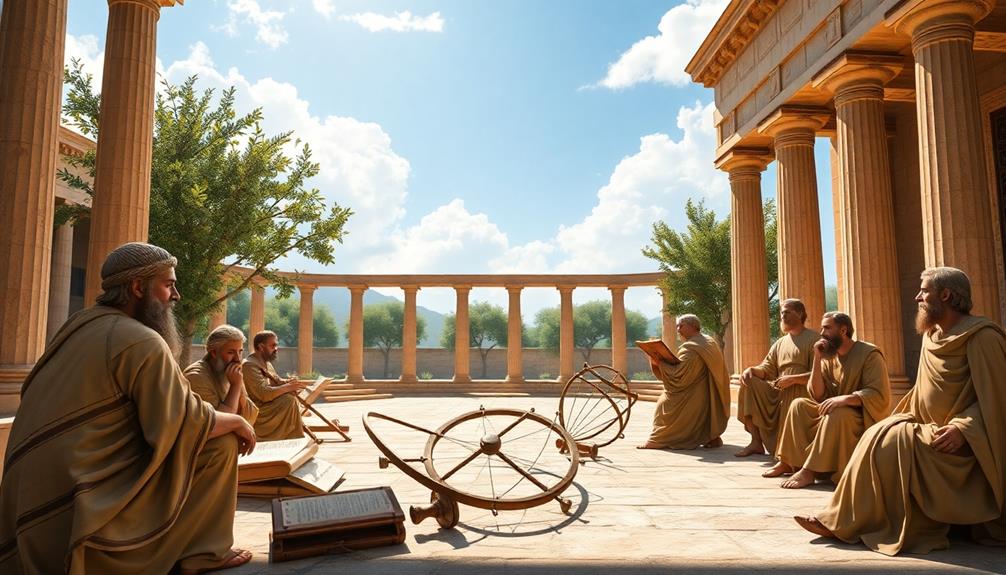
In ancient times, Greek thinkers laid the foundation for modern science through their remarkable discoveries and methodologies. Pioneers like Archimedes made groundbreaking contributions to mathematics, developing methods for calculating areas and approximating pi, which are vital to today's calculus and geometry.
The Greeks pioneered the scientific method, emphasizing empirical observation and logical reasoning, thereby laying the groundwork for future scientific inquiry and experimentation.
Hippocrates, known as the "Father of Medicine," shifted the focus of healthcare from supernatural explanations to natural causes, establishing ethical standards and systematic documentation of diseases. His approach revolutionized medicine, influencing practices that persist today.
Additionally, Aristarchus of Samos introduced the heliocentric model of the solar system, predating Copernicus by nearly two millennia, showcasing the Greeks' forward-thinking astronomical insights.
Archimedes also made significant contributions to physics, particularly with his principle of buoyancy, which remains essential for understanding fluid mechanics and engineering principles.
These discoveries and methodologies not only transformed their respective fields but also continue to impact our understanding of science, mathematics, and medicine, highlighting the enduring legacy of ancient Greek thinkers in our modern world.
The Olympic Games

Ancient Greece didn't just shape modern science; it also laid the groundwork for one of the world's most celebrated sporting events—the Olympic Games. Originating in Olympia in 776 BCE, these games were held every four years in honor of Zeus, attracting athletes from various city-states.
While they began with a simple 192-meter foot race, they evolved to include a variety of disciplines.
Here are three key aspects of the Olympic Games that still resonate today:
- Celebration of Physical Perfection: Athletes competed naked, showcasing their bodies and emphasizing the beauty of physical strength and agility.
- Diverse Events: Over five days, participants engaged in wrestling, boxing, and chariot racing, laying the foundation for the multi-sport events we see in modern sports.
- Recognition and Fame: Victors earned laurel wreaths, public honor, and often statues in their likeness, highlighting the importance of achievement.
The modern Olympic Games, revived in 1896, carry on this rich legacy, reflecting the ancient spirit through the motto "Citius, Altius, Fortius"—"Faster, Higher, Stronger."
This connection keeps the ethos of ancient Greece alive in contemporary sports culture.
Military Strategies
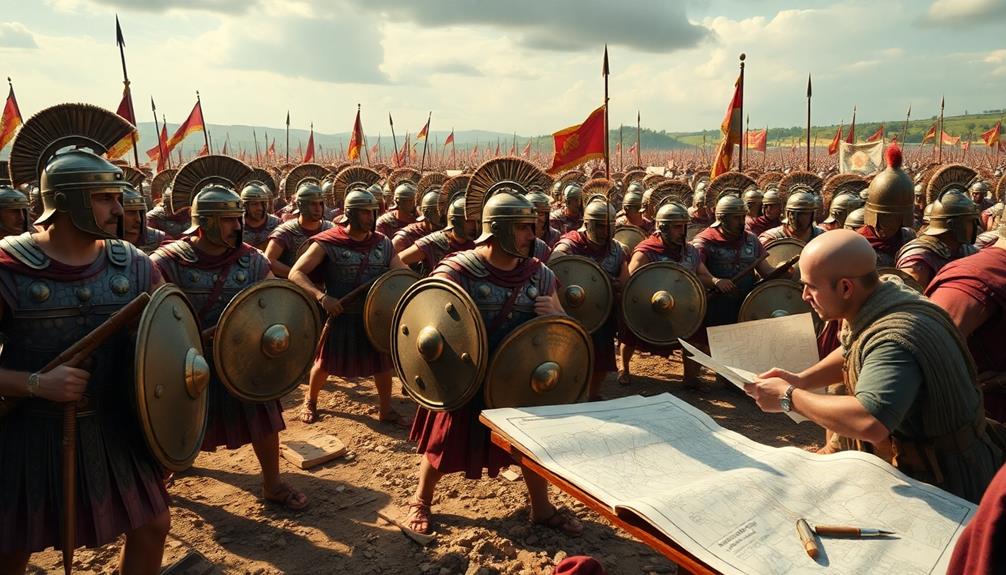
When you think about military strategies, the ancient Greeks set the stage with their phalanx formation, emphasizing unity and discipline.
Their innovative tactics also included psychological warfare, which played an essential role in boosting troop morale and manipulating enemy perceptions.
Understanding these strategies can shed light on how military operations have evolved over the centuries.
Phalanx Formation Tactics
Developed by the Greeks, the phalanx formation revolutionized military tactics, emphasizing the power of unity and discipline. This strategy involved tightly packed infantry soldiers, known as hoplites, standing shoulder to shoulder, creating an impenetrable wall of shields and spears. The phalanx allowed smaller city-states to defend effectively against larger forces, as seen during the Battle of Marathon in 490 BCE.
Here are three key aspects of the phalanx formation:
- Discipline and Training: Soldiers underwent extensive training, fostering camaraderie and a sense of civic responsibility, which led to the rise of citizen armies.
- Adaptability: Alexander the Great enhanced the phalanx by incorporating lighter troops and cavalry, allowing greater maneuverability in various battle scenarios.
- Influence on Future Tactics: The principles of the phalanx formation shaped how armies organized their infantry and approached battlefield tactics for centuries to come.
The ancient Greeks' innovative military tactics not only secured their dominance but also laid the groundwork for future military strategies, showcasing the lasting impact of the phalanx formation on warfare.
Psychological Warfare Importance
In the domain of military strategies, the psychological aspects of warfare play an essential role in determining the outcome of battles. Ancient Greeks understood that morale greatly influenced soldiers' performance. They skillfully employed psychological tactics to gain an edge over their enemies. One such tactic was leveraging "phobos," or fear, to intimidate their opponents before a conflict even began.
Alexander the Great exemplified this approach by using innovative strategies like feigned retreats and surprise attacks. These maneuvers not only confused his enemies but also demoralized them, showcasing the effectiveness of psychological warfare.
Athenian generals recognized the importance of maintaining high spirits among their troops through powerful propaganda and morale-boosting speeches. These efforts kept soldiers motivated and ready for battle, vital in times of conflict.
Moreover, the Greeks understood the impact of public perception. They displayed strength and celebrated victories to bolster citizen support and deter potential aggressors. This strategic use of propaganda resonates in modern military strategies, proving that the lessons learned from ancient Greece continue to shape how nations approach warfare today.
Artistic Contributions
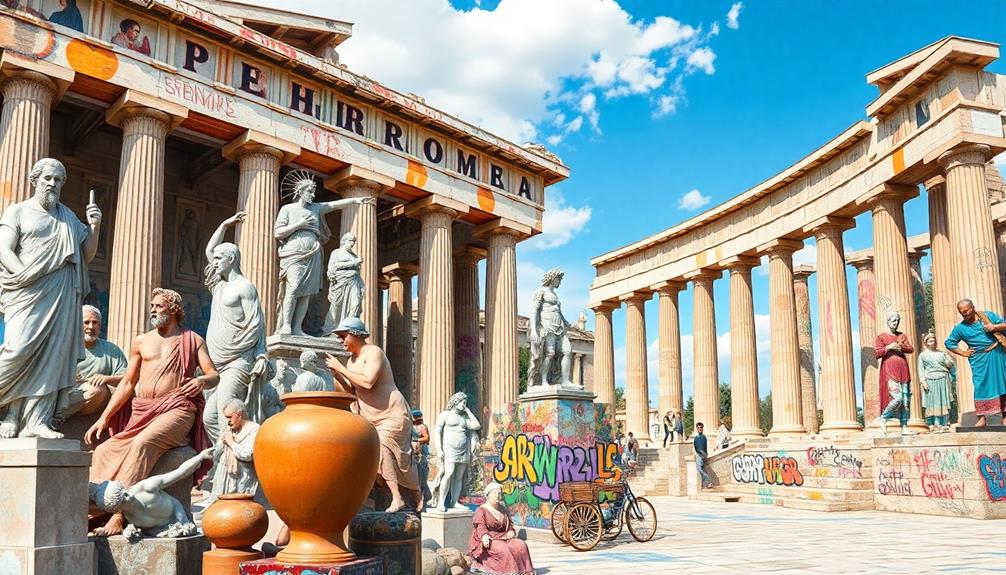
Throughout history, Ancient Greece has profoundly shaped the artistic landscape we're familiar with today. Their artistic contributions have influenced various forms of art, particularly in realism and proportion. You can see these principles in works like the Discobolus, where dynamic poses emerge through contrapposto.
Here are three key areas where Greek art continues to resonate:
- Greek Pottery: The intricate designs and storytelling scenes on Greek pottery have set a standard for ceramics that artists still admire and emulate.
- Greek Architectural Styles: The Doric, Ionic, and Corinthian columns established by the Greeks provide a foundation for modern public buildings, reflecting timeless elegance and functionality.
- The Parthenon: This architectural marvel exemplifies symmetry and harmony, influencing contemporary design principles that prioritize balance and aesthetics.
Additionally, ancient Greek art laid the groundwork for modern performance arts through its theater, introducing genres like tragedy and comedy.
These artistic contributions not only highlight the Greeks' creativity but also underscore their lasting impact on our visual and performing arts today.
Cultural Legacy
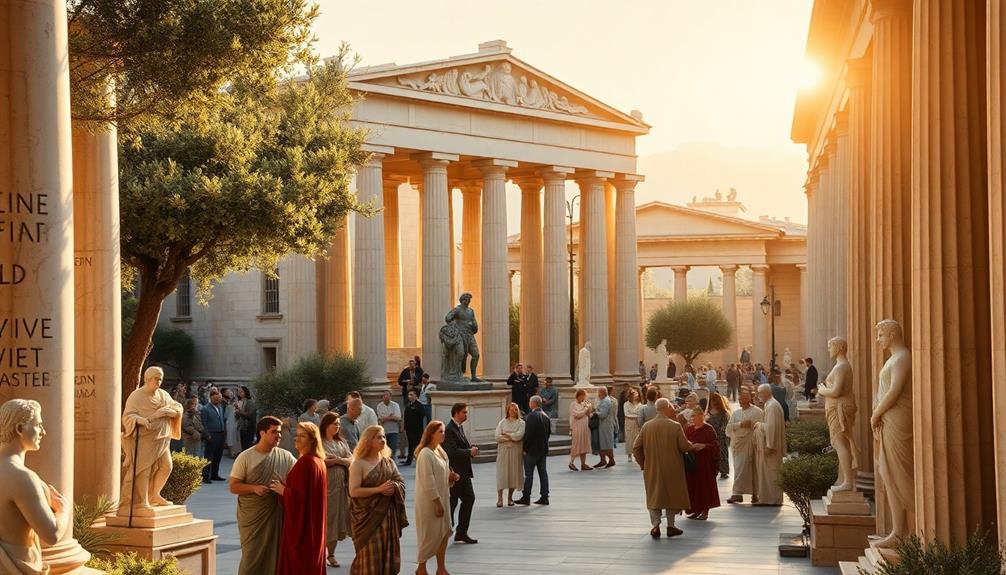
Ancient Greek culture weaves a rich tapestry of influence that extends into various aspects of modern life. The Greeks established timeless narratives through their mythology, filling Western literature and art with gods and goddesses that still resonate today. Their epic tales inspire countless stories, reflecting human traits and emotions, making them relatable across centuries.
The ancient Greek civilization also introduced the Olympic Games, laying the groundwork for today's athletic competitions. This spirit of unity and excellence continues to bring nations together, celebrating the human capacity for achievement.
Moreover, Greek philosophers like Socrates, Plato, and Aristotle greatly shaped our understanding of ethics and political thought. Their ideas on governance directly inform the Principles of Democracy that many countries uphold today.
Language, too, owes much to the Greeks. The Greek alphabet provided the foundation for the English alphabet, influencing our communication and written expression.
Frequently Asked Questions
How Has Ancient Greece Shaped Our World Today?
Ancient Greece shapes your world through democracy, philosophy, and science. You experience civic engagement, critical thinking, and athletic spirit rooted in their innovations. Their architectural styles and foundational ideas continue to influence your life today.
What Are 5 Examples of Ways Ancient Greek Culture Impacts Our Society Today?
Have you ever wondered how ancient Greece influences your life today? From democratic principles and the Olympic spirit to literature, medicine, and the alphabet, these cultural legacies continue to shape our society in profound ways.
What Are 3 Ways in Which Greek Influences Are Felt Today?
You can see Greek influences today in democracy's foundations, the structure of modern literature and theater, and the architectural styles that define public buildings. Each element reflects the enduring legacy of ancient Greek culture.
How Did Ancient Greek Religion Influence the Modern World?
Think of ancient Greek religion as a tapestry, weaving together human traits and divine tales. It's shaped your understanding of morality, enriched your language, and inspired communal celebrations, echoing through modern beliefs and cultural practices.
Conclusion
As you explore these ten ways ancient Greece shaped our modern world, think of it as a tree with deep roots. Each branch—democracy, philosophy, and art—spreads wide, influencing everything that is understood today. Just like a single acorn can grow into a mighty oak, Greece's ideas have flourished and continue to impact our lives. So, the next time you vote or enjoy a good book, remember the ancient Greeks and the seeds they planted for our future.
